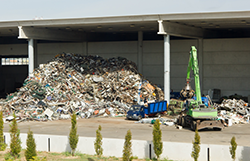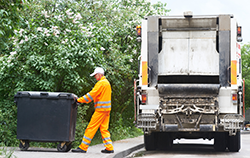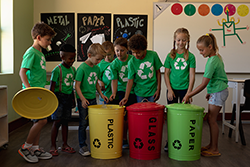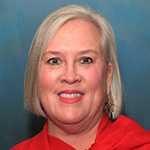The “China Sword” and a Glimpse into the Future of Recycling
As with most types of business (and most aspects of life) it’s been a wild time in the solid waste and recycling industry over the last year. Greg Butler and Todd Preher, both municipal services managers in Kentucky for Republic Services, recently gave Kentucky League of Cities (KLC) members an update during a KLC City EDvantage free webinar.

Republic Services is the second largest solid waste and recycling company in the United States and provides five million pickups per day across 41 states. It serves several communities and has eight landfills in Kentucky.
Some recent history. In 2018, China banned mixed and contaminated paper and plastic from the United States (mostly on the coasts) from entering their country for processing. This is referred to as the “China Sword” as it cut off incoming commodities to improve on its own country’s green policies. Other ports in Southeast Asia could not accommodate the ships or volume.
Due to the China Sword, U.S. commodity markets crashed in 2019, with a 70% reduction in old, corrugated containers (OCC) such as cardboard and a 95% reduction in mixed paper.
In 2020, the dramatic impacts of COVID further stressed the collection and recycling sector due to the necessary but costly changes to safety protocols. As municipal leaders know, sanitation and recycling jobs are tough and dangerous.

COVID also completely changed pickup routes. Preher said commercial trash and recycling loads went way down while residential pickups increased by 30% as people everywhere worked remotely and ordered literally tons of items that were delivered to their homes. This huge increase in residential volume is falling but experts say it will remain to some degree as remote work continues.
Another factor impacting recycling is many facilities are simply old. Our U.S. recycling infrastructure was designed in the 1990s, primarily to separate paper and newspaper. With the massive decline in newspapers, facilities have tried to adapt to lighter plastics, cardboard, and other materials. All of this trickles down to local recycling.
The reality is that recycling is not a municipal profit center, but Preher said their company’s surveys continue to show that residents and businesses want the service because it’s the right thing to do.
Butler added, “We think we should invest in recycling and landfill diversion because it makes more sense for our environment. In Kentucky, it creates jobs, and as with all municipal services, brings other values to the community.”
The good news is that technologies and heightened focus on safety concerns continue to bring new innovations.
As a result of the China Sword, companies in the U.S. are now investing in recycling mills that are better geared to current and future products. Butler said his company has clear goals going forward regarding safety and climate leadership. For example, they are investing in electric batteries for garbage trucks. The company is working to increase recovery of recyclable materials by 40% and exploring alternatives to traditional landfills with a goal to reduce greenhouse gases by 50% by 2030.
He said the biggest issue in recycling at all levels of the process is education, specifically about “contamination.”

All recycling is local and some communities accept different materials than others for recycling, like yogurt containers. Contamination occurs when materials that are not recyclable at your local facility are placed in the cart for recycling. The biggest contamination culprit is plastic bags, which get caught in the sorting machines and have to be manually removed.
Another type of contamination is when materials are not properly cleaned, such as when food residue remains on a plastic yogurt container. All items in a recycling bin should be clean and dry. Otherwise, the entire load will need to go to the landfill. For instance, a soiled pizza box is not recyclable. When the bin itself gets contaminated, that causes ongoing problems.
Aspirational or "wish-cycling" is a problem when entire recycling loads can end up in a landfill due to contamination by a well-intentioned recycler. If you don’t know if something is recyclable, trash it. Helping to educate the public about contamination is one of the best ways municipalities can be part of a solution to a continuing global challenge.
Butler suggests having your city’s director of solid waste or recycling do some public relations concerning proper separation. Have that person advise the city commission/council on recycling. Use social media, provide information for residents at city events – whatever you can do, just get the word out. If your city contracts with a private company for waste management and recycling, check their resources. Republic provides free resources for anyone, whether they are customers or not at the website.
The long-term impacts of the China Sword and pandemic are unknown, but it takes effort, public education and it may cost consumers and cities more as the markets shift. Municipalities are making program modifications that include raising rates, changing services, changing materials lists and a small percentage are cancelling their programs. It’s always a challenge. In 2000 it took 48,000 clear plastic water bottles to create a ton of recyclable material. By 2015 with lighter weight plastics, it took 92,000 bottles to make a ton, meaning there’s more work and energy involved.
Composting, eliminating plastic bags, and other efforts are part of the recycling chain in many parts of the country. Butler said there are materials that have recycle value and those are the materials to focus on, including cardboard, plastics, aluminum, and in some areas, glass.
“We think it’s going to come up over time and it’s worth investing in,” Butler said.
Preher said city officials should think of recycling as something that has to change locally as the markets change globally. Every community should evaluate its program, especially right now, because 8-10% of residential increase is expected to continue with more people working at home.
Bulter and Preher are happy to talk with officials or communities. Republic’s free materials, videos and social tools can help with outreach to local leaders, residents, business, leaders, and schools.
People say they want recycling, so cities everywhere, including Kentucky cities, need to decide their next steps to continue or reset their programs.
Contacts at Republic Services
Greg Butler–Manager, Municipal Services GButler@RepublicServices.com, 859-619-3851
Todd Preher–Manager, Municipal Services, TPreher@RepublicServices.com, 502-345-2432
Free Resources


